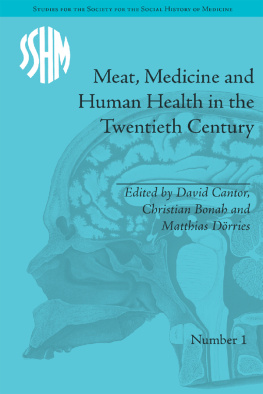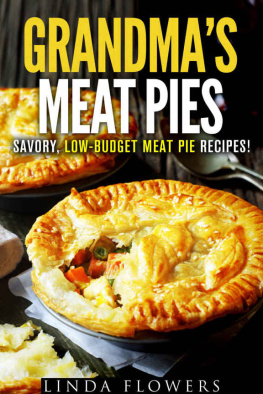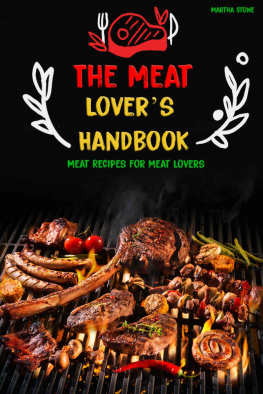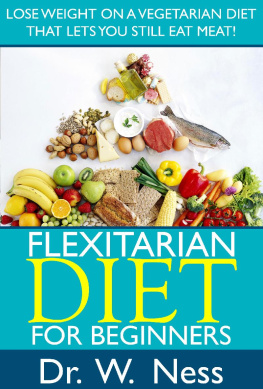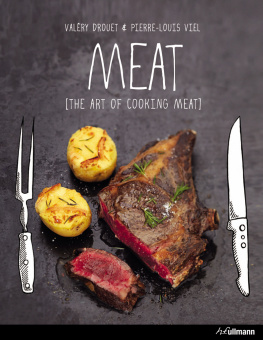Peter Cox - You Dont Need Meat
Here you can read online Peter Cox - You Dont Need Meat full text of the book (entire story) in english for free. Download pdf and epub, get meaning, cover and reviews about this ebook. year: 2003, publisher: Thomas Dunne Books, genre: Art. Description of the work, (preface) as well as reviews are available. Best literature library LitArk.com created for fans of good reading and offers a wide selection of genres:
Romance novel
Science fiction
Adventure
Detective
Science
History
Home and family
Prose
Art
Politics
Computer
Non-fiction
Religion
Business
Children
Humor
Choose a favorite category and find really read worthwhile books. Enjoy immersion in the world of imagination, feel the emotions of the characters or learn something new for yourself, make an fascinating discovery.
You Dont Need Meat: summary, description and annotation
We offer to read an annotation, description, summary or preface (depends on what the author of the book "You Dont Need Meat" wrote himself). If you haven't found the necessary information about the book — write in the comments, we will try to find it.
You Dont Need Meat — read online for free the complete book (whole text) full work
Below is the text of the book, divided by pages. System saving the place of the last page read, allows you to conveniently read the book "You Dont Need Meat" online for free, without having to search again every time where you left off. Put a bookmark, and you can go to the page where you finished reading at any time.
Font size:
Interval:
Bookmark:

This book made available by the Internet Archive.





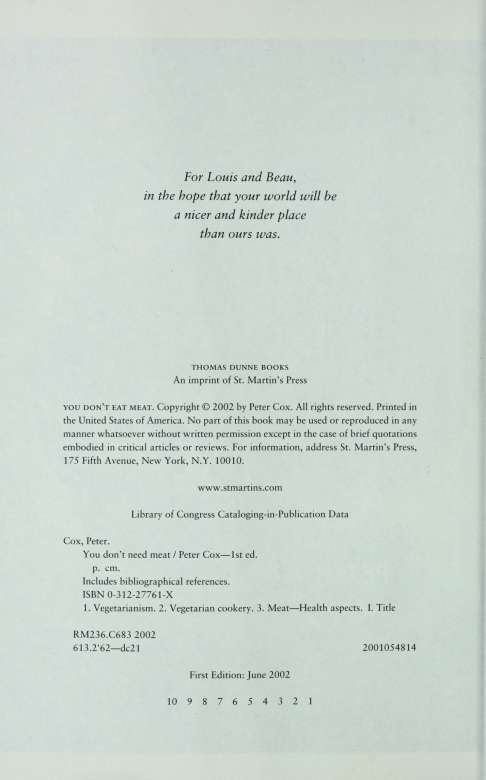
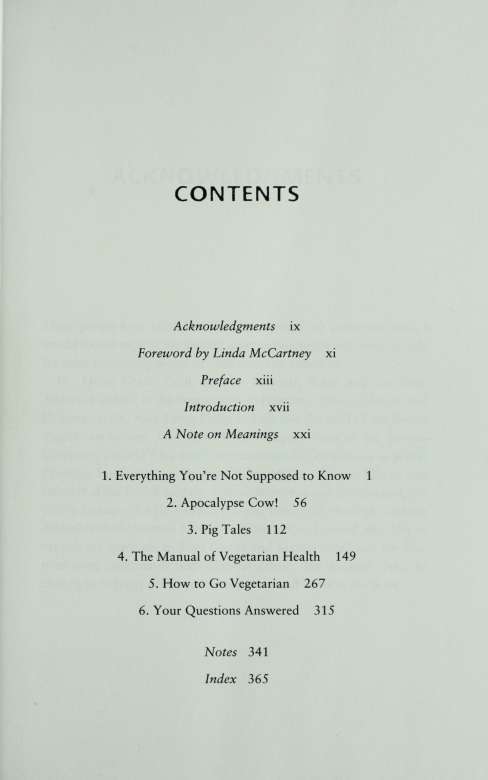
ACKNOWLEDGMENTS
Many people have helped me, in various ways, to write this book. I would like to express my sincere appreciation to the following people for most generously giving of their time and expertise:
Dr. Helen Grant, Colin and Lis Howlett, Barry and Sue Kew, Andrew Kimbrell of the Foundation on Economic Trends, Drs. G. and C. Langley, Dr. Alan Long, Philip L. Pick and the staff of the Jewish Vegetarian Society, Dr. David Ryde, Gregory Sams of the Realeat Company, Joyce D'Silva and Peter Stevenson of Compassion in World Farming, Sarah Starkey, Andrew Tyler, Michael Verney-Elliott, and the staff of the British Library, Science Reference and Information Service in London, the Sir Thomas Browne Library in Norwich, and the Addenbrookes Hospital Library in Cambridge. I would also like to express my gratitude to Tom Dunne and Marcia Markland for their publishing enthusiasm and editorial talent. My greatest debt, as always, is to Peggy for her encouragement and belief in the book.
FOREWORD
My friend Linda McCartney was kind enough to write a Foreword to the 1992 edition of this book, which is reproduced below. Her untimely death in 1998 from breast cancer robbed us of an important voice.
For many years now some of us have been saying "Stop eating animals" because we know that it is pointless and cruel. My friend Peter Cox is one of those who has been saying it loudest.
Unfortunately the majority of those who are steeped in the tradition of meat eating either closed their ears or said they didn't care about the moral arguments.
But now, in this remarkable book, Peter has researched arguments that the majority cannot ignorenot if they care for their health. Or their lives.
His conclusions arefor the meat eateralarming. Those who believe that meat is somehow good for you should read the facts connecting it to heart disease, high blood pressure, and cancer before swallowing another mouthful.
This is a book that will change lives and save lives. I hope that yours is one of them.
PREFACE
This little book has had an interesting evolution. An instant bestseller when it was published in Britain all of fifteen years ago, it was less than half the size of the volume you now hold in your hands. From there, it went to Germany, Japan, Holland, and several other countries, arriving back in the U.K. again some five years later, where it was rewritten and greatly expanded. Then it went traveling all over again; back to Japan and Germany and other ports of call too numerous to mention. And so, eventually, it's arrived in Americarewritten once more and further expanded. Since Britain is guilty of unleashing such dubious delights as beef eating and Mad Cow Disease on the world, please consider this book as one Brit's way of saying "Sorry!" Some people have said some very kind things about it along the way, and I blush to repeat them, but sometimes these things have to be done. Britain's most eminent food critic, Derek Cooper, scared me a great deal when he wrote, "I think from now on Peter Cox ought to lock his bedroom door at night; otherwise he might well be woken up by heavy breathing in the small hours and find two men in white coats trying to stun him with a bolt pistol prior to suspending him from a convenient meat hook ... he just published the most forceful indictment of the meat industry I have yet seen; there must be large groups of men yearning for his blood in every cattle ring and slaughterhouse in the country. Since reading You Don't Need Meat I have crossed over the road every time I have approached a meat market."
xiv PREFACE
Elle magazine said, "Cox's argument is riveting; his conclusions are utterly disturbing." I understand it takes quite a lot to disturb Elle magazine, so I guess that's a compliment. The Financial Times, however, was sure I was a modern-day Adolf Hitler. They wrote, "For Peter Cox, vegetarianism has all the appearance of a particularly austere religious order.... Austere men are often dangerous: Cromwell, Robespierre, Mussolini and Hitler, for example.... Cox and Hitler share a trait: they both believe the future belongs to vegetarians." Austere, moi} Surely they were jesting.
The Nursing Times reassured me a great deal when they concluded that I was not, in fact, severely delusional (and I think they are more of an authority on mental health than the Financial Times is): "Cox brings together in a readable form much recent research into nutrition and diet. This is a controversial and provocative book but, whatever one's ultimate conclusions concerning Cox's views, the arguments cannot be lightly dismissed; neither can they be relegated to the 'lunatic fringe' of food faddism."
Even the Meat Trades Journal concluded that "Peter Cox is a very convincing man," although they went on to say that I was probably the sort of person who, if I wasn't writing books, would probably be undertaking dastardly acts of despicable violence and terrorism.
This eruptive theme was continued by the Birmingham Post, who found the book "Explosive! If you've ever thought twice about the contents of the beef burger you're eating or felt unease when the latest meat-related disease hogs the headlinesthen you should buy this book.... One of the most thought-provoking tomes you may read this year.... Do yourself a favor and buy this book now."
And even the conservative-minded Daily Telegraph welcomed the book "because it will rattle the cages, or perhaps crates, of people paid a lot of money to protect the interests of factory farming." Another national newspaper, The Observer, whined, "The trouble with Mr. Cox's book is that, having read it, it's all or nothing." Then they decided, I think, to come down on my side with the resigned, tight-lipped comment, "Pass me the tofu." Raw tofu? I think I'd prefer to eat Mussolini's hair shirt.
"Peter Cox's arguments are fascinating," said The Lancet, quite
simply. ("Fascinating," I hope, because they're good argumentsnot because they're fascinating examples of delusional psychosis.)
Today newspaper was more interested in my bank balance than anything else, writing, "Peter, who first spat out meat at the age of two, has sold more than half a million bookswhich must, at a conservative estimate, make him a millionaire." Now that's a good example of delusionary thinking.
The magazine Vegetarian Living more or less canonized me when they wrote: "Peter Cox is both energetic and amiable, with the kind of charm normally found in the diplomatic service. As he has become our foremost vegetarian ambassador perhaps this is not surprising."
But I was soon brought down to earth again by London's Evening Standard, who went for the jugular: "Peter Cox appears to have an identity problem, having at a young age confused himself with plant life." They didn't specify which plant, precisely, I had confused myself with, but it's true that I've always been weirdly attracted to carrots. Now I know why.
Font size:
Interval:
Bookmark:
Similar books «You Dont Need Meat»
Look at similar books to You Dont Need Meat. We have selected literature similar in name and meaning in the hope of providing readers with more options to find new, interesting, not yet read works.
Discussion, reviews of the book You Dont Need Meat and just readers' own opinions. Leave your comments, write what you think about the work, its meaning or the main characters. Specify what exactly you liked and what you didn't like, and why you think so.



